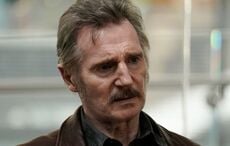- ORIGINAL REPORT / JACKIE AND BOBBY KENNEDY IN PASSIONATE, DOOMED FOUR-YEAR AFFAIR / CLICK HERE
Jackie Kennedy gave her husband John F. Kennedy’s 1960 presidential campaign something American politics had never seen before -- megawatt glamour. The striking young aristocrat in the slim cut Chanel suits was such a dramatic departure from generations of matronly political wives preceding her that the American public often stood five deep on city streets just to get a gawk at her.
After the austerity of the 1950s Jackie’s appearance spelled youth and vitality and a new direction for the nation. Her beauty was obvious, but she had brains and toughness of character too. It’s no wonder she became a figure of fascination overnight.
In his new book “Bobby and Jackie: A Love Story” (Atria), author C. David Heymann argues that fascination with her extended to the president’s younger brother Bobby Kennedy as well.
Heymann begins what he calls his final book on the Kennedy family by chronicling the worst day of Jackie’s life, Friday, November 22, 1963, the day of President John F. Kennedy’s assassination in Dallas.
From that point Heymann charts the impact of the tragic event on the two people who were closest to JFK, Jackie and his brother Robert Kennedy.
It’s Heymann’s fourth book on the famous Irish American family, and there’s no question he’s an authority on his subject. But “Bobby and Jackie: A Love Story” is not a sensational tell-all; it’s the work of a respected historian, although the subject still arouses deep passion in certain quarters. In answer to this Heymann’s book is filled with the research and transcripts to seemingly silence most of his critics.
Most of his critics, but not all. Laurence Leamer, the author of “The Kennedy Men, The Kennedy Women and Camelot” recently told the press, “I believe Heymann is just trying to make a buck. Yes, Bobby and Jackie had a relationship as friends, but this romance is a total exaggeration.”
Last week a noted Kennedy family friend Arthur Schlesinger told the press that Heymann was simply beneath contempt. (Heymann, for his part, has previous quotes from Schlesinger that verify the affair).
So considering the controversy surrounding the question of a fully-fledged romance between the president’s wife and his adoring younger brother, was Heymann ever hesitant to document it in print? And when he did begin, did he feel that his sources offered conclusive proof?
“Definitively yes,” Heymann told the Irish Voice and IrishCentral during an interview on Monday.
“Most of my interviews were taped and are available now in the Special Collections of the State University of New York at Stony Brook. I’ve been writing about the Kennedys since 1989 when I did “A Woman Named Jackie” and echoes of this relationship first started being heard, coming to me via the interviews I conducted.”
Jackie was still alive at that time Heymann began his research, so he just touched upon the affair briefly in his first book on her.
“But I’ve been conducting interviews with friends and associates since the mid-1980s. That’s 25 years of material. To me there’s no question about it. The time has come to tell the story,” Heymann says.
In Heymann’s view it’s not even very surprising that Jackie and Bobby began an affair. Jackie had more in common with Bobby than she ever did with JFK, he says.
Not only did they both have to endure the pain and anguish of JFK’s murder together, but Heymann believes another motivating factor was the large residue of anger left over on Jackie’s part about her painful marriage. It was not, Heymann says flatly, the idealized coupling that we’ve all been led to believe in over the years.
“Jack virtually made a bordello out of the White House,” says Heymann. “People were well aware of his daily dalliances with women who were brought in to the White House swimming pool and other places to have sexual interludes with JFK. In Jackie’s case I think there was a great deal of anger after his death that also led to her becoming involved with Bobby Kennedy.”
In Heymann’s viewing, airing skeletons from the Kennedy family closet performs a worthwhile -- not prurient -- purpose. It reminds readers that they were human and fallible, and subject to the same passions and jealousies as the rest of us. This is a fact that often gets lost in the hero-worshipping histories that have already been written, Heymann feels.
“This was a family that was wealthy and freewheeling and powerful and did what they wanted to do,” says Heymann. “In those days they operated with an impunity from press interference in their personal lives that we just don’t have today.
“I mean, look at Bill Clinton. He had one dalliance and it immediately became headlines. JFK had multiple dalliances and not a word ever appeared in print. It took The New York Times 30 years before they even reported on JFK’s womanizing. It just was not on anyone’s radar.”
It wasn’t just the fallout of the shared tragedy that brought Jackie and Bobby together, Heymann says. Both Joe Kennedy Senior and Bobby were intellectuals, especially compared to JFK, whose reading fare consisted of Ian Fleming’s “James Bond” series and the occasional Broadway musical.
Jackie was temperamentally much closer to the other two than to her own husband. The truth is JFK was, Heymann says, a much more political animal. Bobby and Jackie also had similar reading interests.
Regardless of whether their feelings had ever turned romantic, as Heymann maintains, there was a deep an abiding sadness to the relationship between the two figureheads.
In 1958, in an event that brought them closer for the first time, Jackie had a stillbirth (her second) while JFK was off living the high life in the Mediterranean with Senator George Smathers and his brother Teddy Kennedy. When Jackie came to consciousness again in the hospital it was Bobby who was sitting at the foot of her bed. He was, Heymann says, the one you could always count on.
At the time there was a rumor -- a myth, the author says -- that Joe Kennedy offered her a million dollars to remain married to Jack for political reasons related to his upcoming presidential run.
“Jackie was one of these women who believed she could reform her husband and make him monogamous. But of course she could not,” Heymann says.
Heymann quotes the writer Truman Capote in his new book, who said he first heard about the affair with RFK from Jackie’s sister.
“It was passionate, but it was fraught with incalculable difficulties: his career, her renown, his marriage, her affairs with other men, including Aristotle Onassis. There was something sad about it,” Capote said.
Bobby had wed Ethel Skakel, daughter of a coal magnate, in 1950, and by the time of JFK’s murder the couple already had eight children. There was no question that a public romance with Jackie could ever blossom between them.
Still, privately and publicly, Jackie continued to support and champion Bobby’s presidential ambitions -- even in the face of strong dislike by most of the female members of the Kennedy clan.
In March 1968, when Bobby announced he would be seeking the Democratic nomination, Jackie quickly ran afoul of the resentments of Bobby’s wife, Heymann’s book reveals.
“Won’t it be wonderful when we’re back in the White House?” Jackie asked Ethel Kennedy at a family gathering. Ethel replied, “What do you mean “we”? You’re not running.”
Just minutes after winning the California primary, on June 4 of the same year, Bobby was shot dead by Sirhan Sirhan at the Ambassador Hotel in Los Angeles. At the hospital he was declared brain-dead, but Ethel, completely distraught, refused to shut down the respirator.
Remarkably it was Jackie Kennedy, the book reveals, who ordered the respirator turned off that night, even signing the consent form.
As with JFK’s death she kept her head, performing the duties of a wife. According to writer Gore Vidal, quoted in Heymann’s book, “The one person Jackie ever loved was Robert Kennedy.”




Comments